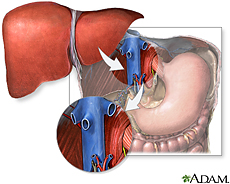National Institutes of Health
- The primary NIH organization for research on Liver Transplantation is the National Institute of Diabetes and Digestive and Kidney Diseases
 A service of the U.S. National Library of Medicine
A service of the U.S. National Library of Medicine  National Institutes of Health
National Institutes of Health
Your liver helps fight infections and cleans your blood. It also helps digest food and stores energy for when you need it. You cannot live without a liver that works. If your liver fails, your doctor may put you on a waiting list for a liver transplant. Doctors do liver transplants when other treatments cannot keep a damaged liver working.
During a liver transplantation, the surgeon removes the diseased liver and replaces it with a healthy one. Most transplant livers come from a donor who has died. Sometimes a healthy person donates part of his or her liver for a specific patient. In this case the donor is called a living donor. The most common reason for transplantation in adults is cirrhosis. This is a disease in which healthy liver cells are killed and replaced with scar tissue. The most common reason in children is biliary atresia, a disease of the bile ducts.
People who have transplants must take drugs for the rest of their lives to keep their bodies from rejecting their new livers.
NIH: National Institute of Diabetes and Digestive and Kidney Diseases
References and abstracts from MEDLINE/PubMed (National Library of Medicine)
